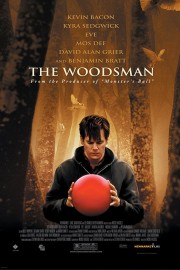The Woodsman
Kevin Bacon has a trivia game named after him- the geek fave “Six Degrees of Kevin Bacon”- but he doesn’t have an Oscar nomination, let alone a Golden Boy of his own. Maybe that comes with getting your start in the likes of the slasher classic “Friday the 13th” and “Animal House.” It’s not for a lack of strong work. He’s done Oscar-worthy work in films as varied as “A Few Good Men,” “Mystic River,” “Apollo 13,” “Frost/Nixon,” “Death Sentence,” and even escapism like “The River Wild.”
But the performance I really can’t shake out of my head is the one he gave in 2004’s “The Woodsman”- produced by “Precious” director Lee Daniels from the stage play by Steven Fechter. As directed by Nicole Kassell (who scripts with Fechter), the film digs deep into the compulsions and psychology of Walter- Bacon’s character- as he tries to make it on the streets after twelve years in prison. Wisely, the film doesn’t let us in on the reason for his incarceration. We see him get an apartment- across the street for a school playground (it’s the only one that would take his money). We see him get a job at a lumberyard. We see him hook up with a coworker (Bacon’s real-life wife Kyra Sedgwick). We see him visited by his brother-in-law (a sympathetic and realistic Benjamin Bratt), who’s the only one in the family who’ll talk with him. And we see him talk to a court-ordered psychiatrist (Michael Shannon).
Walter used to molest underage girls. That’s why his sister Annette won’t talk to him (let alone let him see her daughter Carla). That’s why his boss’ secretary (Eve) does her research, and posts a picture of a girl on a swing where she writes, “We’re watching you!” on it. That’s why a cop (Mos Def) lets himself into Walter’s apartment when a young girl gets attacked nearby. Bacon lets us deep into his character’s mind. He tests himself, although we’re not sure what to make of such tests. He watches the playground, although he eventually notices someone else watching the playground as well.
At one point, we wonder whether he’s self-destructing. He asks his brother-in-law about whether he’s ever had thoughts about his daughter, even after he hears his sister will see him. He follows a girl to the park, where he strikes up a conversation with the young bird watcher.
Bacon is remarkable in a performance we witness from the inside. He’s fearless in what he reveals about Walter even without saying a word. And he’s tender and touching with Sedgwick’s Vickie, who accepts him despite what he’s done and becomes an ally and lover. But eventually, she even worries what will happen to him if the pressure gets to be too much.
I’d forgotten over the years how this story played out. It doesn’t take any easy left turns. This was Kassell’s first film as a director, and it’s strikingly assured. It takes guts to take such material, even for an experienced filmmaker. She makes all the right moves, stylistically, story-wise, in dealing with actors. Watching it again, the ending seems a bit too tidy, but ultimately, it’s hard to pass judgment on Walter. As a wise man once said, “Let he who is without sin cast the first stone.” Our sins may not be as unforgivable as Walter’s, but sometimes, they can certainly give us a sense of identification with that part of people like Walter that wonders whether we’re beyond redemption of our own.










